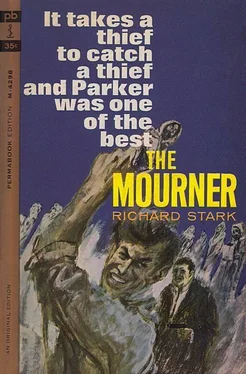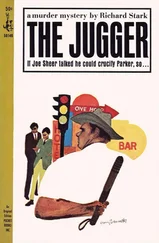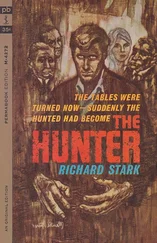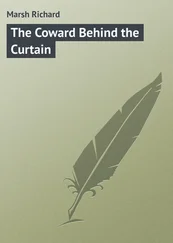“Yes. I don’t be—”
“What on earth for?”
“In my former job it was thought I might find it necessary to take my own life under certain conditions. I somehow do not believe that will ever be necessary now.”
“Good God, man, poison! What happens when you eat?”
“In normal activity of the jaw, the capsule cannot be broken. But what I would like, if possible, is to have some dental surgeon remove it. If you could obtain for me a dentist who would not ask a lot of questions, I would be most grateful, most grateful.”
“I think that could be arranged,” Harrow said, nodding. “I’ll speak to my own dentist about it. He’s a good man; I’ve known him for years.”
“Excellent. And the other items?”
“No problem at all. We’ll get you the papers first, and then dispose of the funds. Some you’ll want to invest, no doubt, and the balance you’ll want handy for living expenses. No problem.”
“Very good.”
“But now,” Harrow said, “I have my terms.”
“Ah?”
Harrow’s eyes, all at once, were shining. He leaned forward. “Before we go any farther,” he said, “I want to hear the details. I want to know exactly how you managed to get the statue away from Willis, and I want to know what on earth your job was that you had to go around with a capsule full of poison in your mouth.”
Menlo smiled. “I see.” He had forgotten this essential fact about Ralph Harrow; the man was a romantic. It was the first thing that he had learned about Harrow, from hearing Parker and Bett talk about him back in Washington. On business matters Harrow was a total realist, but within was a strong streak of romanticism. It was the romantic, not the businessman, who had paid fifty thousand dollars for the mourner. “I will be most happy to tell all,” Menlo said.
“Let me refresh that drink first.”
“Thank you so much.”
Menlo told it all then, from the time he had first received the assignment until he had arrived in Miami, deleting from the story only the sexual encounters with Bett Harrow and the murderous encounter with the old policeman. He talked also about his role as Inspector in Klastrava, and this led Harrow to question him about various high points in his fifteen-year career, and about his life as a guerrilla in the latter stages of World War II. Nearly an hour went by, and Harrow was still asking questions, Menlo still talking. Harrow seemed fascinated, and Menlo, like most people, enjoyed having a good audience.
But finally it was finished. Harrow thanked him for spending so much of his time in telling the story, assuring him again that everything he’d asked for would be supplied. “Now, Mr. Menlo — or should I say Inspector Menlo, eh? — now I do want to see the mourner. The statuette. Could you bring it?”
Menlo considered briefly, but he no longer had any doubts. Harrow could be trusted. He finished his drink, got to his feet. “I shall get it at once.”
“Thank you. I’ll be waiting.”
Menlo rode the elevator back down to the seventh floor, and got the mourner out of his other suitcase. He wrapped the little statuette in one of the white bath towels from the bathroom, and brought it back upstairs under his arm. The elevator operator looked at it oddly, but didn’t say anything.
He knocked again, and once again Harrow came to the door. “You were very quick. Is that it?”
“Yes, this is it,” Menlo said, and bowed.
Harrow took the bundle and immediately began to unwrap it. “Go on in,” he said. “Go on in.” He pushed the door closed behind Menlo, and continued to stand in the foyer, unwrapping the statue.
Menlo walked past him into the sitting room and there was Parker sitting on the white sofa, a gun in his hand. Menlo took one shocked look at Parker’s face and acted without hesitation: he twisted his jaw hard to the right, and bit down.
Menlo had been too excited, back there in Kapor’s house, too excited to think about checking the bodies and making sure the two of them were dead. And a derringer with .22 rim-fire cartridges isn’t very much of a gun...
Parker awoke to darkness, with something burning his side. He was lying on his back on a lot of rocks with an invisible flame searing his side. He moved, and the rocks made noises under him, scraping together, and then memory imploded into his mind.
They’d underestimated the fat bastard. They’d figured him to wait till they were clear of the house, maybe even clear of the city, and he’d second-guessed them. He’d dragged that crazy little gun out from somewhere, and now he was gone with the money and the mourner, and here Parker was lying on broken pieces of statues with a burning in his side.
He rolled over to the right because the pain was on the left side, and got his knees under him, then stabbed out with his hands till they hit a pedestal. Slowly he climbed up the pedestal till he was standing on his feet. He was weak and dizzy, and when he took a step it was bad footing because of all the broken pieces of statue everywhere on the carpet. He made it to a wall, and then felt his way along the wall to the end and made the turn, bumping into the bookcase. Now he knew where he was. He kept going around the wall till he got to the door and found the light switch. He flicked the light on.
Everything was a mess. The room was a mess, broken statues and tipped-over pedestals everywhere, the mourner and the suitcase both gone. His side was a mess, shirt and trousers cold and sticky with blood. And Handy, sprawled over there like a dummy dumped off a cliff, was an even worse mess. From the look of the blood on him, and his dead-white face, he was gut-shot.
Parker went over, still very shaky on his feet, and dropped to his knees beside him. Handy was still breathing, very slow and shallow. Both guns were still here, the .380 and the Terrier, lying on the floor among the broken statues. The fat bastard had been in a big hurry.
It was a good thing. If he’d taken his time, he might have done the job right.
Never underestimate the power of a smooth-talking amateur.
Parker gathered up the Terrier, got back on his feet, and lurched over to the door. He opened it, and saw light. Down at the far end of the hall there was a staircase — the front staircase, not the one they’d come up — and light was coming up from there. And, dimly, party noises.
Parker looked at his watch. Twenty to twelve. He’d been out for over three hours. Kapor was home, the party was going on.
He thought it out, came to a decision, and sat down on the floor next to the door. He kept the door slightly open, so he could hear when the party ended, be warned if anybody came upstairs.
When he pulled his shirt out of his trousers, so he could look at the wound, the pain suddenly intensified, almost blacking him out again. A kind of green darkness closed in all around him, like a camera lens closing. He leaned his back against the wall and breathed deeply until the green darkness went away. Then he looked at the wound.
The bullet had plowed a deep furrow in the flesh along his side, just above the belt. His whole side was discolored, gray and purplish and black, and sensitive to the touch, like a charley horse. The furrowed flesh was ragged, and smeared with dried blood. Fresh blood still oozed sluggishly from the wound. As far as he could tell, the bullet wasn’t in him, but had scored his side and kept on going.
So he’d come out better than Handy. All he had was a pain in the side. It wouldn’t even disable him badly, once a doctor had seen to it.
He looked at his watch again. Ten to twelve. The party was still going on. To his right he could hear the shallow, labored breathing of Handy. If the party lasted too long, Handy wouldn’t make it.
Читать дальше












